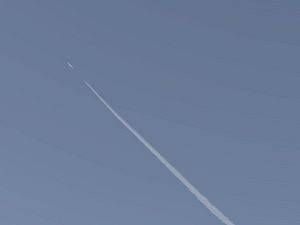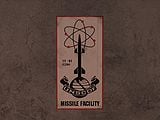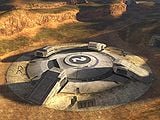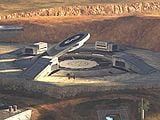11-B1 intercontinental ballistic missile: Difference between revisions
From Halopedia, the Halo wiki
BaconShelf (talk | contribs) mNo edit summary |
m (→top: adding feed and range fields for weapon infobox) |
||
| Line 12: | Line 12: | ||
|length= | |length= | ||
|ammotype=Fissile material{{Ref/Reuse|ENC328}} | |ammotype=Fissile material{{Ref/Reuse|ENC328}} | ||
|capacity= | |||
|feed= | |feed= | ||
|operation= | |operation= | ||
|rate= | |rate= | ||
|velocity= | |velocity= | ||
|optics= | |||
|range={{Convert|5632.7|km|mi}}{{Ref/Reuse|ENC328}} | |range={{Convert|5632.7|km|mi}}{{Ref/Reuse|ENC328}} | ||
}} | }} | ||
Revision as of 14:24, May 17, 2023
| 11-B1 intercontinental ballistic missile | |
|---|---|

| |
| Production overview | |
|
Type: |
|
| Specifications | |
|
Ammunition type: |
Fissile material[1] |
|
Effective range: |
5,632.7 kilometres (3,500.0 mi)[1] |
| Service history | |
|
In service: |
|
The 11-B1 is an intercontinental ballistic missile used by the UNSC Armed Forces during the Human-Covenant War for long-range high-yield nuclear strikes against ground-based targets. They are capable of causing megatons of nuclear damage.[1] 11-B1s are housed in missile silos, reinforced against military strikes and normally staffed with a UNSC Defense Force security detail. Several 11-B1s were stored at the Kupiga Simu military facility in Africa on Earth.[2]
The 11-B1 was considered obsolete prior to the Human-Covenant War, due to the relative stability within the UNSC. They were seen as unnecessary because of the resulting large-scale destruction, damaged ecosystem, nuclear fallout and radiation that follows the detonation of a 11-B1. However, during the war, 11-B1s were used as a last-resort weapon against Covenant forces that evaded planetary MAC defense weaponry.[1]
Production notes
The Halo 3 multiplayer map Standoff is based around a cluster of 11-B1 missile silos. Additionally, several 11-B1 ICBMs can be seen flying overhead on the map, often two at a time.[2]
Gallery
List of appearances
- Halo 3
- Heroic Map Pack (First appearance)
Sources


